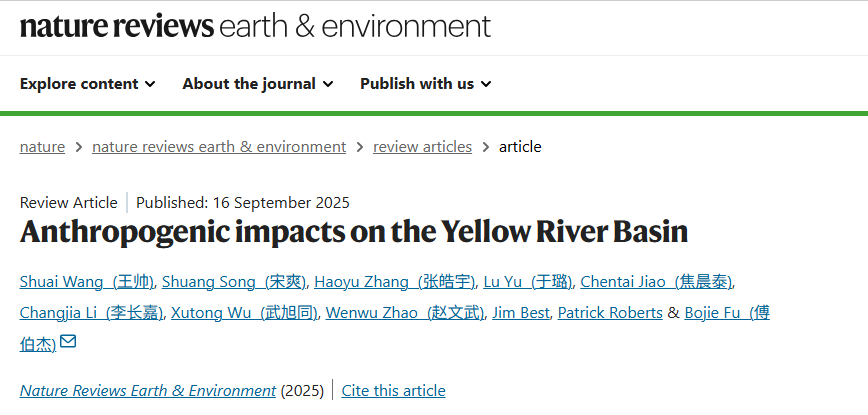Professor Wang Shuai's Team from the Faculty of Geographical Science Published an Article in Nature Reviews Earth&Environment
On September 16, the team of Professor Wang Shuai from the Faculty of Geographical Science published a paper titled "Anthropogenic impacts on the Yellow River Basin" in Nature Reviews Earth & Environment.

The abstract of the paper is as follows:
The Yellow River Basin supports a population of 200 million people and contains 15% of arable land in China. Water scarcity in the region is being exacerbated by climate change and human activities. In this Review, we discuss anthropogenic impacts on the hydrological cycle and sediment dynamics of the Yellow River since the 1950s. The Yellow River had one of the largest sediment loads in the world, peaking at 2.1 Gt yr−1 in 1958. Such high sediment loads elevated flood risk; therefore, reservoirs, conservation and revegetation projects were implemented, reducing sediment transport by 90% since the 1980s. However, these efforts also impacted the hydrology of the Yellow River Basin, leading to an increase in evapotranspiration fluxes (1.79 mm yr−2, 1980–2020) and reduced runoff. In addition, human water use has increased by 15.8% since the 1980s. The resulting reductions in soil water storage and intensification of the vertical water cycle foreshadow potential resource crises and will potentially lead to irreversible ecosystem degradation. Predicting the outcomes of water management policies and engineering projects is essential but highly complex owing to feedback loops and interactions between human activities and hydrological changes. Addressing these challenges, which are also faced by other arid-region rivers, will require dynamic monitoring of water storage and improved understanding of human–hydrological interactions.
Reference: https://doi.org/10.1038/s43017-025-00718-2


